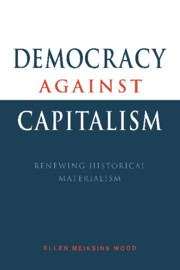Book contents
- Frontmatter
- Contents
- Acknowledgements
- Introduction
- I HISTORICAL MATERIALISM AND THE SPECIFICITY OF CAPITALISM
- 1 The separation of the ‘economic’ and the ‘political’ in capitalism
- 2 Rethinking base and superstructure
- 3 Class as process and relationship
- 4 History or technological determinism?
- 5 History or teleology? Marx versus Weber
- II DEMOCRACY AGAINST CAPITALISM
- Conclusion
- Index
2 - Rethinking base and superstructure
Published online by Cambridge University Press: 13 October 2009
- Frontmatter
- Contents
- Acknowledgements
- Introduction
- I HISTORICAL MATERIALISM AND THE SPECIFICITY OF CAPITALISM
- 1 The separation of the ‘economic’ and the ‘political’ in capitalism
- 2 Rethinking base and superstructure
- 3 Class as process and relationship
- 4 History or technological determinism?
- 5 History or teleology? Marx versus Weber
- II DEMOCRACY AGAINST CAPITALISM
- Conclusion
- Index
Summary
The base/superstructure metaphor has always been more trouble than it is worth. Although Marx himself used it very rarely and only in the most aphoristic and allusive formulations, it has been made to bear a theoretical weight far beyond its limited capacities. To some extent, the problems already inherent in its original short-hand usage were aggravated by Engels' tendency to use language suggesting the compartmentalization of self-enclosed spheres or ‘levels’ – economic, political, ideological – whose relations with one another were external. But the real problems began with the establishment of Stalinist orthodoxies which elevated – or reduced – the metaphor to the first principle of Marxist-Leninist dogma, asserting the supremacy of a self-contained economic sphere over other passively reflexive subordinate spheres. More particularly, the economic sphere tended to be conceived as more or less synonymous with the technical forces of production, operating according to intrinsic natural laws of technological progress, so that history became a more or less mechanical process of technological development.
These deformations of Marx's original historical–materialist insights have fixed the terms of Marxist debate ever since. Both sides of the various disputes that have raged among Marxists in the past several decades have been effectively locked into this theoretical grid. Sometimes there has been a tendency to treat the deformations as the Marxist gospel, and to accept or reject Marxism accordingly. Anyone (like E.P. Thompson) working somewhere in the fissures between the alternatives presented by this theoretical framework is likely to be badly misunderstood by supporters and critics alike, or to be dismissed as an anomaly, a theoretical impossibility.
- Type
- Chapter
- Information
- Democracy against CapitalismRenewing Historical Materialism, pp. 49 - 75Publisher: Cambridge University PressPrint publication year: 1995
- 2
- Cited by



